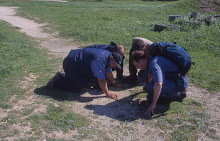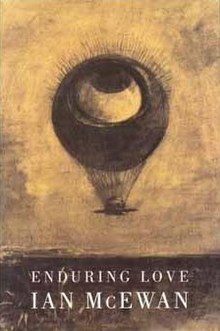I said that McEwans's novel "Enduring love" was illuminating. But it was illuminating in a dialectical way. In fact. not even a statement in the novel is true, and not even a feeling is deep. False conceptions and shallow felleing is the mark of middle class - but it is rarely so well described. Morevoer, if a false thesis is well presented. it is easy to find its anthitesis.
The main idea udnerlying the novel is that feelings and reason are at odd. This doesn't correspond to my experience. True skepticals are wam and passionate - read the character of Socrates in Plato dialogues. And proletrians, thouth ardently passionate, are very clear-minded (see my previous post ). Although feelings can obscure reason (and reason repress feelings) there is no fundamanetal contradiction between the two, Only with a bad disposition of mind we can garble them. It is like right and left hand in knitting - the coordination is dificult and sometimes we make mistakes, but we don't claim that there is a fundamental contraditiction between left and right hand.
When I was a chid I often wondered "why feelings exist?" When I touch the fire I feel pain - but why? Why this long chain fire -> pain -> retreat? Would it not be simpler and faster fire->retrat? Thanks to the misunderstandings of McEwan I understood that we learn also with feelings. We learn through mental representations. These representations can be verbal, visual, and also made of feelings. Feeling representations are probably most primitive, and are present also in many animals, but for this very same reason they are also powerful and somtimes irreplaceable.
Visualizzazione post con etichetta McEwan. Mostra tutti i post
Visualizzazione post con etichetta McEwan. Mostra tutti i post
lunedì 25 agosto 2014
Feelings
Etichette:
borghesia,
coscienza,
dialettica,
McEwan,
piccola borghesia,
ragione,
scienza,
sensiblità
Enduring love
I have read McEwan's novel "enduring novel". I don't know if it is a great novel, but it is illumianting. Its core meaning is science and rationalism as religious (metaphysical) justification of the bourgeois way of life. I dare say that the meaning of my life - if life has a meaning - is that the burgeousis way of life and all the bourgeouis way of thinking are agains reaston. Today this means a rather solitary lfie, since we have married the bourgeois way of life with irraionalism.
I report an excerpt of the novel:
" We live in a mist of half-shared, unreliable perceptions, and our sense data come warped by a prims of desire and belief, which tilted out memories too. (...) Pityless objectivity, especially about ourselves was always a doomed social strtegy, We're descended from the passionate, indignant tellers of half truths that in order to convince others, simultaneously convinced themselves. (...) This is why there re divorces, border diputes and wars, and this is why this statue ofthe Virgin weeps blood and that one of Ganesh drinks milk. And that was shy metaphysics and science were such curageous etrprises (..) huma artifacts set against the grain of human nature Disinterested truths".
This is a surprendent example of self-convinced half-truths: we ebguile ourselves, but is necessary very much beguilement to say that hat divorce from misunderstanding, and not from the fact that sometimes love ends, and that.wars arise self-deception and nio from conflicting interests. From this to say that our wars are disinterested truth ant the wars of other are due to ignorance - like in the Middle West today - is just a small step further.
I report an excerpt of the novel:
" We live in a mist of half-shared, unreliable perceptions, and our sense data come warped by a prims of desire and belief, which tilted out memories too. (...) Pityless objectivity, especially about ourselves was always a doomed social strtegy, We're descended from the passionate, indignant tellers of half truths that in order to convince others, simultaneously convinced themselves. (...) This is why there re divorces, border diputes and wars, and this is why this statue ofthe Virgin weeps blood and that one of Ganesh drinks milk. And that was shy metaphysics and science were such curageous etrprises (..) huma artifacts set against the grain of human nature Disinterested truths".
This is a surprendent example of self-convinced half-truths: we ebguile ourselves, but is necessary very much beguilement to say that hat divorce from misunderstanding, and not from the fact that sometimes love ends, and that.wars arise self-deception and nio from conflicting interests. From this to say that our wars are disinterested truth ant the wars of other are due to ignorance - like in the Middle West today - is just a small step further.
Etichette:
borghesia,
capitalismo,
McEwan,
ragione,
scienza
mercoledì 6 agosto 2014
Me and us
Ian Mcwan writes "This is our mammalian conflict - what to give to the others and what to keep for yourself. Treading that line (..) is what we call morality. (..) our crew enacted morality's ancient, irresorvable dilemma us, or me." All this seems self evident, and fundamental to all societies, and yet the reasoning is irremediably flawed. "Us", in effect, does not exist; it is the collection of a number of singularity, few in small societies or in a family, many in large societies. And the resolvable conflict is not between me and a non-existant us (an abstract us), but between individuals with theyr legitimately conflicting itnerests. Law is an attempt at regulating these ever-changing and evolving relationships. and morality is personal law. Selfishness often (but not always) does not allow conflicts to be resolved, and this is the base for the importance we put on altruism. But commercial conctracts, for instance, are perfectly compatible with selfishness and indeed such contracts, based on not-altruistic feelings, can contribute much to the well-being of the society.
Margareth Thatcher said that society - us - does not exist. She was right, since ther is not a social body resulting from the collection of individuals, and she was wrong, since relationships do exist.
Anyway, there are circumstances wehre it is natural to use the pronoun us. For instance, supporters of a football team usually say "us" when referring to the team - even if they are only supporters, not actual players. "us" is used always in contrast to "them". Collectivity is a collection of relationship, "us" is a super-individual body that springs when it is necessray to fight an enemy. Self-sacrifice is rarely necessary in peace and in ordinary relationships, it is instead unavoidable in war, be it the war against another nation, another class, or (in the case of Christianism), against the Evil.
Margareth Thatcher said that society - us - does not exist. She was right, since ther is not a social body resulting from the collection of individuals, and she was wrong, since relationships do exist.
Anyway, there are circumstances wehre it is natural to use the pronoun us. For instance, supporters of a football team usually say "us" when referring to the team - even if they are only supporters, not actual players. "us" is used always in contrast to "them". Collectivity is a collection of relationship, "us" is a super-individual body that springs when it is necessray to fight an enemy. Self-sacrifice is rarely necessary in peace and in ordinary relationships, it is instead unavoidable in war, be it the war against another nation, another class, or (in the case of Christianism), against the Evil.
Etichette:
contratto sociale,
guerra,
McEwan,
moralità,
Thatcher
Iscriviti a:
Post (Atom)

